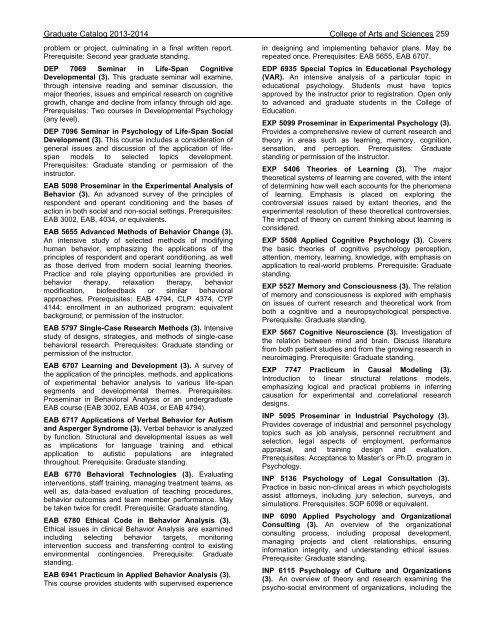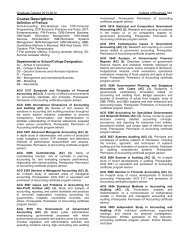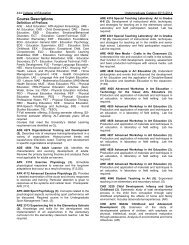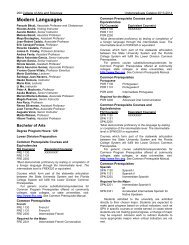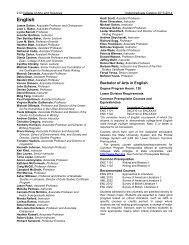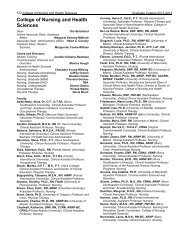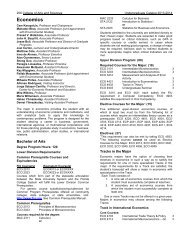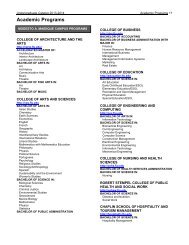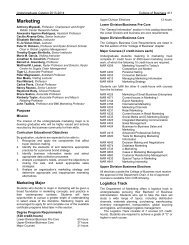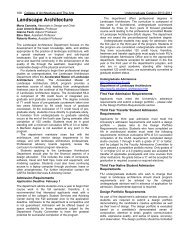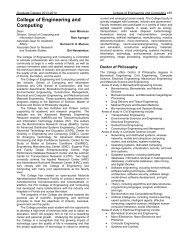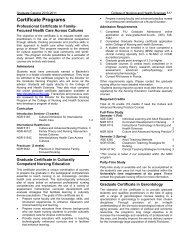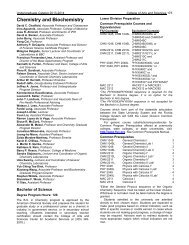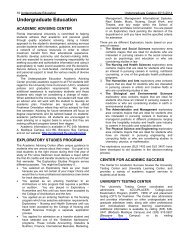Psychology - Course Catalogs
Psychology - Course Catalogs
Psychology - Course Catalogs
You also want an ePaper? Increase the reach of your titles
YUMPU automatically turns print PDFs into web optimized ePapers that Google loves.
Graduate Catalog 2013-2014 College of Arts and Sciences 259<br />
problem or project, culminating in a final written report.<br />
Prerequisite: Second year graduate standing.<br />
DEP 7069 Seminar in Life-Span Cognitive<br />
Developmental (3). This graduate seminar will examine,<br />
through intensive reading and seminar discussion, the<br />
major theories, issues and empirical research on cognitive<br />
growth, change and decline from infancy through old age.<br />
Prerequisites: Two courses in Developmental <strong>Psychology</strong><br />
(any level).<br />
DEP 7096 Seminar in <strong>Psychology</strong> of Life-Span Social<br />
Development (3). This course includes a consideration of<br />
general issues and discussion of the application of lifespan<br />
models to selected topics development.<br />
Prerequisites: Graduate standing or permission of the<br />
instructor.<br />
EAB 5098 Proseminar in the Experimental Analysis of<br />
Behavior (3). An advanced survey of the principles of<br />
respondent and operant conditioning and the bases of<br />
action in both social and non-social settings. Prerequisites:<br />
EAB 3002, EAB, 4034, or equivalents.<br />
EAB 5655 Advanced Methods of Behavior Change (3).<br />
An intensive study of selected methods of modifying<br />
human behavior, emphasizing the applications of the<br />
principles of respondent and operant conditioning, as well<br />
as those derived from modern social learning theories.<br />
Practice and role playing opportunities are provided in<br />
behavior therapy, relaxation therapy, behavior<br />
modification, biofeedback or similar behavioral<br />
approaches. Prerequisites: EAB 4794, CLP 4374, CYP<br />
4144; enrollment in an authorized program; equivalent<br />
background; or permission of the instructor.<br />
EAB 5797 Single-Case Research Methods (3). Intensive<br />
study of designs, strategies, and methods of single-case<br />
behavioral research. Prerequisites: Graduate standing or<br />
permission of the instructor.<br />
EAB 6707 Learning and Development (3). A survey of<br />
the application of the principles, methods, and applications<br />
of experimental behavior analysis to various life-span<br />
segments and developmental themes. Prerequisites:<br />
Proseminar in Behavioral Analysis or an undergraduate<br />
EAB course (EAB 3002, EAB 4034, or EAB 4794).<br />
EAB 6717 Applications of Verbal Behavior for Autism<br />
and Asperger Syndrome (3). Verbal behavior is analyzed<br />
by function. Structural and developmental issues as well<br />
as implications for language training and ethical<br />
application to autistic populations are integrated<br />
throughout. Prerequisite: Graduate standing.<br />
EAB 6770 Behavioral Technologies (3). Evaluating<br />
interventions, staff training, managing treatment teams, as<br />
well as, data-based evaluation of teaching procedures,<br />
behavior outcomes and team member performance. May<br />
be taken twice for credit. Prerequisite: Graduate standing.<br />
EAB 6780 Ethical Code in Behavior Analysis (3).<br />
Ethical issues in clinical Behavior Analysis are examined<br />
including selecting behavior targets, monitoring<br />
intervention success and transferring control to existing<br />
environmental contingencies. Prerequisite: Graduate<br />
standing.<br />
EAB 6941 Practicum in Applied Behavior Analysis (3).<br />
This course provides students with supervised experience<br />
in designing and implementing behavior plans. May be<br />
repeated once. Prerequisites: EAB 5655, EAB 6707.<br />
EDP 6935 Special Topics in Educational <strong>Psychology</strong><br />
(VAR). An intensive analysis of a particular topic in<br />
educational psychology. Students must have topics<br />
approved by the instructor prior to registration. Open only<br />
to advanced and graduate students in the College of<br />
Education.<br />
EXP 5099 Proseminar in Experimental <strong>Psychology</strong> (3).<br />
Provides a comprehensive review of current research and<br />
theory in areas such as learning, memory, cognition,<br />
sensation, and perception. Prerequisites: Graduate<br />
standing or permission of the instructor.<br />
EXP 5406 Theories of Learning (3). The major<br />
theoretical systems of learning are covered, with the intent<br />
of determining how well each accounts for the phenomena<br />
of learning. Emphasis is placed on exploring the<br />
controversial issues raised by extant theories, and the<br />
experimental resolution of these theoretical controversies.<br />
The impact of theory on current thinking about learning is<br />
considered.<br />
EXP 5508 Applied Cognitive <strong>Psychology</strong> (3). Covers<br />
the basic theories of cognitive psychology perception,<br />
attention, memory, learning, knowledge, with emphasis on<br />
application to real-world problems. Prerequisite: Graduate<br />
standing.<br />
EXP 5527 Memory and Consciousness (3). The relation<br />
of memory and consciousness is explored with emphasis<br />
on issues of current research and theoretical work from<br />
both a cognitive and a neuropsychological perspective.<br />
Prerequisite: Graduate standing.<br />
EXP 5667 Cognitive Neuroscience (3). Investigation of<br />
the relation between mind and brain. Discuss literature<br />
from both patient studies and from the growing research in<br />
neuroimaging. Prerequisite: Graduate standing.<br />
EXP 7747 Practicum in Causal Modeling (3).<br />
Introduction to linear structural relations models,<br />
emphasizing logical and practical problems in inferring<br />
causation for experimental and correlational research<br />
designs.<br />
INP 5095 Proseminar in Industrial <strong>Psychology</strong> (3).<br />
Provides coverage of industrial and personnel psychology<br />
topics such as job analysis, personnel recruitment and<br />
selection, legal aspects of employment, performance<br />
appraisal, and training design and evaluation.<br />
Prerequisites: Acceptance to Master’s or Ph.D. program in<br />
<strong>Psychology</strong>.<br />
INP 5136 <strong>Psychology</strong> of Legal Consultation (3).<br />
Practice in basic non-clinical areas in which psychologists<br />
assist attorneys, including jury selection, surveys, and<br />
simulations. Prerequisites: SOP 6098 or equivalent.<br />
INP 6090 Applied <strong>Psychology</strong> and Organizational<br />
Consulting (3). An overview of the organizational<br />
consulting process, including proposal development,<br />
managing projects and client relationships, ensuring<br />
information integrity, and understanding ethical issues.<br />
Prerequisite: Graduate standing.<br />
INP 6115 <strong>Psychology</strong> of Culture and Organizations<br />
(3). An overview of theory and research examining the<br />
psycho-social environment of organizations, including the


